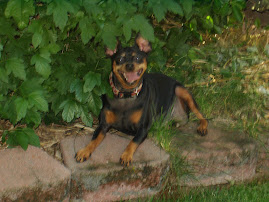Many products commonly found around the house and yard are dangerous to dogs. Ingestion of toxic substances can lead to upset stomach, vomiting, diarrhea, seizures, and even organ failure and eventual death. Some substances such as pesticides and acetone can be dangerous even if a dog does not ingest them. They can cause harm by being inhaled or absorbed through the skin.
Commercial pesticides are the most common cause of dog poisonings. Fly baits containing methomyl such as Stimukil, and slug and snail baits containing metaldehyde such as Snarol, Buggetta, and Slugit Pellets, are particularly dangerous. Methomyl is rapidly absorbed into the skin, lungs, and gastrintestinal tract and is broken down in the liver. Vomiting, seizures, and death are the most common signs of intgestion. Metaldehyde is a neurotoxin, a poison that affects the nervous system. Ingestion of less than a teaspoon of a 2 percent metaldehyde product by a 10-pound dog can cause harm. Moke and gopher baits and rat poisons are also dangerous to dogs. Avoid using any of these in areas where accessible to your dog and keep packages of pesticides safely locked away.
Human medications are second only to pesticides in causing animal poisonings. They can be lethal to dogs and should be kept out of reach. Advise overnight guests to keep any medications locked away. Even common pain relievers can be dangerous to dogs. One regular strength 200-milligram ibuprofen tablet (Advil, Motrin) can cause stomach ulcers in a 10-pound dog; ingestion of two or more tablets of ibuprofen can cause seizures and coma. The most commonly reported medications involved in animal poisonings are nonsteroidal anti-inflammatory painkillers such as ibuprofen, antidepressant; cold and flu medicines; and diet pills.
Seasonal products that contain toxins include anti-freeze, Christmas tree water, and liquid potpourris. Ingestion of just a small amount of antifreeze can be fatal to a dog. Keep driveways and garages clean of car drippings. Christmas tree water contains fertilizers that can upset the stomach. Stagnant tree water also can breed bacteria, leading to vomiting, nausea, and diarrhea if ingested. Liquid potpourris are caustic. Licking or ingesting potpourris can result in chemical burns, vomiting, retching, hypersalivation, or depression.
Hazards to be aware of during warm weather months include lethal strains of blue-green algae usually found in stagnant bodies of water. Ingesting even a small amount can kill a dog within an hour. Cocoa bean mulch, often used in gardens, contains the substance theobromine, which is also found in chocolate. A 50-pound dog who eats 2 ounces of cocoa bean mulch may suffer stomach upset; after eating 9 ounces or more would probably be fatal. Another garden hazard is compost, which is filled with decaying matter harboring dangerous bacteria that can make a dog sick. Fertilizers, too, are hazardous. They contain heavy metals such as iron. Ingesting a large amount of fertilizer can cause gastrointestinal upset and possibly obstruction and may even affect the heart and liver. Swimming pool cleaning supplies may contain harmful chemicals and citronella candles can cause gastrointestinal inflammation if a dog eats them.
Other toxic products include household cleaners, rubbing alcohol, ice-melting products, batteries, pain, boric acid, hair coloring, and other human grooming products such as shampoo and petroleum products. The best prevention is to keep these items out of your dog's reach.
Subscribe to:
Post Comments (Atom)






No comments:
Post a Comment